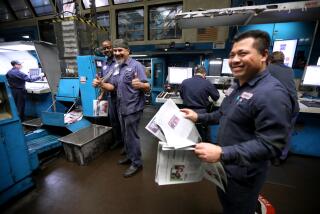The Net and the news
It’s an article of faith among newspaper journalists that our work is the foundation upon which television and radio news programs are built. After all, broadcasters don’t spend nearly as much on reporting as their print competitors do. So you can imagine the tut-tutting in newsrooms last week when a memo surfaced from Ellen McDonnell, National Public Radio’s director of morning programming, announcing that the company was canceling all of its newspaper subscriptions to save money. And why not? Almost all of those papers make their stories available online for free.
The irony is that NPR stations spend countless hours of airtime reminding listeners that the programs they provide for free cost money to produce, and would no longer be available if listeners paid nothing for them. The same could be said of the articles NPR employees will now be reading for free, given how little newspapers make from online advertising relative to their production costs.
The real source of irritation for ink-stained journalists isn’t NPR, however; it’s their employers’ insistence on giving away their work online. Some want to revive efforts to charge for the Web versions of their articles, a strategy that hasn’t failed for every newspaper that’s tried it -- just the vast majority of them. Others talk of forming cartels with other news organizations to force Internet users to pay for access to any newspaper’s stories. (That faint rustling you hear is coming from Upton Sinclair’s grave.) These ideas run counter to the realities of the digital information age, including the proliferation of information sources and the ability (and eagerness) of newsmakers to speak directly to the public. Even if publishers find a way to make their content scarce online -- a well-nigh impossible feat, as the music and movie industries will attest -- they may succeed only in withdrawing from the competition for readers.
That competition is what it’s all about. Any business model that limits a newspaper’s potential readership is hurting its own prospects. At the same time, it’s far from clear how newspapers will turn their growing online audience into revenue. Newspapers used to be uniquely positioned to convey advertisers’ messages to their local audiences, but one of the disruptive aspects of the Internet is that it has given advertisers multiple ways to reach customers directly. Disrupting technologies force companies to rethink everything they do, rather than simply trying to sustain old cost structures in a new environment. While we at The Times struggle with this transition, we encourage our fellow journalists at NPR to keep reading -- and citing -- our work. Every reader counts in today’s battle for audience, even the ones who don’t pay.
More to Read
A cure for the common opinion
Get thought-provoking perspectives with our weekly newsletter.
You may occasionally receive promotional content from the Los Angeles Times.






